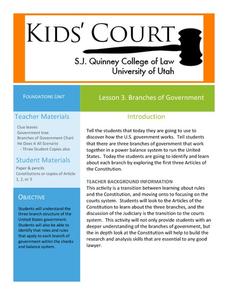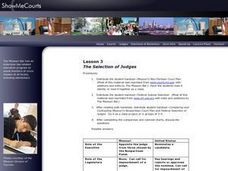National Endowment for the Humanities
George Washington: The Precedent President
Everyone knows that George Washington was the first president, but do your scholars know why that was so important? The lesson plan, the third in a sequence of three, allows learners to understand how George Washington set a precedent...
National Endowment for the Humanities
Chief Executives Compared: The Federalist Papers
Delve into the responsibilities of the president by looking at President Hamilton's opinion of the presidential office in his own words. The second in a three-part series, the resource also offers an interesting compare-and-contrast...
National Endowment for the Humanities
Lesson 4 James Madison: Internal Improvements Balancing Act—Federal/State and Executive/Legislative
Who has the power? The founding fathers asked the same question when the United States was formed. Learners explore issues that arose during Madison’s presidency that raised constitutional questions. Through discovery, discussion, and...
PBS
Evolution of the Presidency: Theodore Roosevelt to Franklin D. Roosevelt
How much power should a president be allowed to exert? Theodore Roosevelt and Franklin D. Roosevelt exercised their power according to their interpretations of the United States Constitution, and these interpretations affected the...
PBS
The Roosevelts: An Intimate History—Snapshot Lessons
The Roosevelt family was one of the most influential and prominent political forces in the 20th century, leaving behind a wide-ranging legacy of conservation, progressivism, and economic growth. Learn more about President Theodore...
Administrative Office of the US Courts
US v. Alvarez
Is it illegal to lie about military service? Discuss the ways the First Amendment affects the Stolen Valor Act with a lesson that focuses on the Supreme Court case U.S. v. Alvarez. As high schoolers learn more about the history of the...
American Constitution Society
Constitution in the Classroom: The Right to Vote
The system of checks and balances is integral to the functionality of the United States government. Learn more about the ways the three branches of the government work together—and about the limitations of their power—with an informative...
Curated OER
Woodrow The White House Mouse
Inauguration Day is January 20. Implement an entire week's worth of mini activities to help young historians become knowledgeable of the President's job, the executive branch, and the White House. The worksheets focus on research skills,...
Youth Outreach
Connecting the Separate Powers
Scholars demonstrate what they know about the separation of powers through role play. Two individuals act out a skit as the remaining class members discuss and decide whether the interaction they observed is an appropriate example of the...
School Improvement in Maryland
Executive Order
After reading information about Executive Order #9066, class members assume the voice of an 18 year-old Japanese-American born in California and placed in an internment camp. Individuals then craft a letter to President Roosevelt...
K12 Reader
Branches of Government
Set down the basics of the three branches of government with the reading passage included here. After reading, class members answer five questions related to the passage.
iCivics
Branches of Power
Learners take on the roles of the legislative, judicial, and executive branches of government in the United States and work to develop public policy issues and ideas into laws in this engaging and well-designed online interactive.
Curated OER
Lesson 3: Branches of Government
Young historians climb through the three branches of the US government in the third lesson of this five-part series. While reading the first three Articles of the Constitution in small groups, children write facts on paper leaves that...
iCivics
Foreign Policy: War
What is the difference between foreign and domestic policy? What are the primary differences in what the United States hopes to accomplish through foreign aid, the military, and the creation of treaties? Your class members will examine...
iCivics
A Very Big Branch
Through detailed secondary source reading material and an interactive "true/false" activity, learners discover the depth and complexity of the executive branch in the United States government. Topics covered include executive...
iCivics
For The President, All In A Day's Work
How does the president of the United States get the authority to exercise his/her duties? What responsibilities and tasks go into a hard day's work for the president? Here is a lesson plan that includes several instructional materials...
Curated OER
United States Government
Which branch of government carries and enforces laws in the United States? What two governing bodies make up Congress? Using this simple graphic organizer, your young historians will organize the flow of responsibilities afforded to the...
Curated OER
The White House
Create a mini-White House in your classroom! After researching information about the Executive Branch and the duties of the president, learners construct an accurate three-dimensional replica of a portion of the United States White House.
Curated OER
The Role of the Executive Branch in the Lawmaking Process
Students examine Article I, Section 7, and Article II, Sections 2 and 3, of the U.S. Constitution, explain the president's role in the lawmaking process, and define the term veto.
Curated OER
The Importance of Inauguration Day
As Inauguration Day approaches, prepare your learners by researching the protocol of years past.
Curated OER
The Selection of Judges
Students analyze documents to determine the steps taken in the selection of judges.
Curated OER
The Role of the Judiciary in a System of Separation of Powers and Checks and Balances
Students determine the difference between the different branches of government and assess the role of each within the American governmental system.
Curated OER
The Role of the Judiciary in a System of Separation of Powers and Checks and Balances
Students determine the role of each branch of government in a system of checks and balances. They demonstrate the role of the judiciary in American government
Curated OER
Executive Government: Executive Decision Making
Students make executive decisions. In this Social Studies lesson, students explore the concept of executive decisions through a game of chess. Students role play a year-level formal plan and implementation.

























